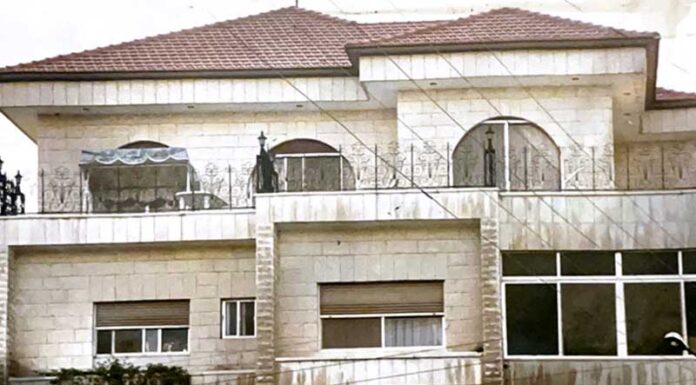By Shaikha Alshamsi
In the collective memoir of Amel’s family, only one character emerged as the silent, enduring protagonist – the house.
It stood with stoic dignity, an edifice that has survived with the passage of time. Its walls were encrusted with stories of generations.
Like a blink of an eye, she remembered it all.
Approaching the entrance, framed by the raspberry trees and a path of flagstones, the house called with a sense of peace. Every summer, she would go out with her sister and seek refuge under these raspberry trees. Her fingers deliberately embraced ruby-red secrets that held the warm taste of afternoons.
As one would enter inside, the parlor unfolded. She began to smell the trunks of old shoes, clothes and worn furniture.
She was in the living room.
In the corner, Amel would find a vintage rocking chair that patiently awaits its next holder. She would walk around the room that bathed in the soft glow of sunlight filtering through the floral-patterned curtains. Her gaze drifted towards the faded wallpaper adorned with pen marks.
She grabs another pen and says, “Mama, Mama, would you measure our height? I really want to see how much I’ve grown.”
The living room was the heart of the house. Its windows framed the changing seasons, creating a canvas upon which Amel and her sister painted the portraits of their youth.
She walked two steps further and found herself gently pushing the door to her room. A collection of journals cradled on the quilted bed. She settled and took notes on all the dreams she wanted to achieve.
With her fueled energy, Amel then raced down the hallway to her father’s room. The uneven floorboards creaked beneath her feet.
Her eyes were drawn to a weathered shelf, a reliquary of literary treasures that bore witness to countless discussions.
Seated by the window, her father greeted her with a newspaper in hand.
With a warm smile, he said,
“Here you go. Let’s see what the world has to say today.”
His room reflected all the shared enthusiasm to unravel the day’s narratives.
A sudden cascade of old traditional music spilled from her mother’s room. Intrigued, she followed the enchanting strains and stepped in right away. Like a sentinel, a grand mirror captured the room’s personality, a mosaic shaped by the woman who curated it with love. She spotted a large wooden closet where abayas hang alongside clothes, reading glasses and a piece of oud.
“It was a smell that lingers like a symphony,” Amel mused.
She then looked around and stopped by the long staircase that spiraled upwards. These stairs, dusty and familiar, led her to the rooftop. For her, the rooftop was a simple escape above the house.
Within this open space, Amel displayed photographs on the edge as a gentle archive of family moments. A small giggle skipped her lips as she took a glance at the depictions of their ordinary joys.
In the quiet moments before dawn, when the world lay hushed under the veil of night, Amel’s mother tended to a small flock of sheep.
From her bedroom, Amel observed the tranquil scene. A scene where the sounds of hay rustled, and the sheep’s muted movements merged with the stillness.
Breaking the silence with Amel’s voice,
“Mama, why do you care for the sheep like that?”
Turning with a serene smile, her mother replied,
“They’re family. Everyone under this roof is.”
With the call to Fajr prayer, the roosters on the outskirts of the yard announced the dawn. Cock-a doodle- doo, Cock- a doodle- do, they gathered and flapped their wings. Their unpretentious presence added a touch of rustic charm that created a lasting bond between the house and the daily habits that shaped its early mornings.
Amel’s mornings carried on in the middle of the kitchen. She would collect colorful hand-painted plates and display them across the subtle patterns of the tablecloth.
“We had plates for each meal, a mismatched collection of designs and sizes. Some had delicate floral designs while others bore the vibrant colors of more contemporary times,” Amel said.
The aroma of Balaleet wafted through the air. She inhaled the scent, savoring the essence of the dish.
Closely, Amel watched her mother’s move with a keen yet unintrusive eye. The clatter of utensils, the rhythmic stirring and the soft murmurs of ingredients sizzling on the stove, they all formed a soothing harmony.
What was once a backdrop to all these shared moments took an unexpected turn.
One morning, the orchestrator of these rituals was noticeably absent. Amel approached her mother’s room with her eyes reflecting concern and deep sorrow.
She softly inquired,
“Mama, is everything alright?”
Her mother, bearing the weight of pain,
“I have not been feeling well and I am not able to eat.”
Amel, grappling with fear,
“I’ll measure your blood pressure, don’t worry.”
Uncertainty, this was the feeling that overshadowed the house. Her mother eventually succumbed to the relentless grasp of diabetes. Amel’s heart echoed with nothing, but grief and each day seemed like a heavy stride.
The vibrant hues of family traditions were subdued, and the once familiar scents of the kitchen held a bitter tinge. Now, the house became a sanctuary for shared tears and whispered conversations.
As the years passed, the house turned into a gathering hub for the extended family including Amel’s siblings and all their children.
Yet, with each reunion, the bright spirit of the house was slowly fading. It left in its wake a palpable sense that it was no longer the same.
Amid this evolving feeling, Amel’s brother received a surprising offer. This offer would reshape the entire house’s purpose.
Amel’s phone rang.
With anticipation, she answers,
“Hello?”
Her brother’s voice full of excitement,
“I have been offered an opportunity for the house.”
Amel, momentarily caught off guard, responds,
“What kind of opportunity?”
“It’s an offer to rent the house and renovate it into a determination center. It can be a place for those seeking recovery,” her brother said.
For a few minutes, silence reigned.
Amel finally spoke,
“All our memories are here but I think it’s best if we accept this offer. That’s what our mother would have wanted us to do.”
They were required to remove all the furniture and take all their belongings.
“I just couldn’t leave my mother’s clothes. I donated them and only left her favorite dress with me. I also sold the books to Al Twar Library in Dubai,” she said.
Everything changed.
The vintage armchairs and weathered furnishings made way for a more functional reception area. The kitchen experienced a significant makeover. The worn countertops were replaced with stainless steel surfaces.
The trusty old stove was upgraded to a modern counterpart. The yard now features a colorful play area for children with red swings, a green slide and a bright yellow teeter-totter.
“I have one photograph of the house. I always look at it to rewind these memories and never forget them,” Amel said.
She thought that the house has always been more than just bricks and beams. This house plays a character in the story of their lives, but its role had shifted.
“In every corner and every creak, there’s a story,” she mused. “And now, the house is becoming the storyteller of a new chapter, one of resilience and healing.”


















